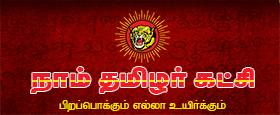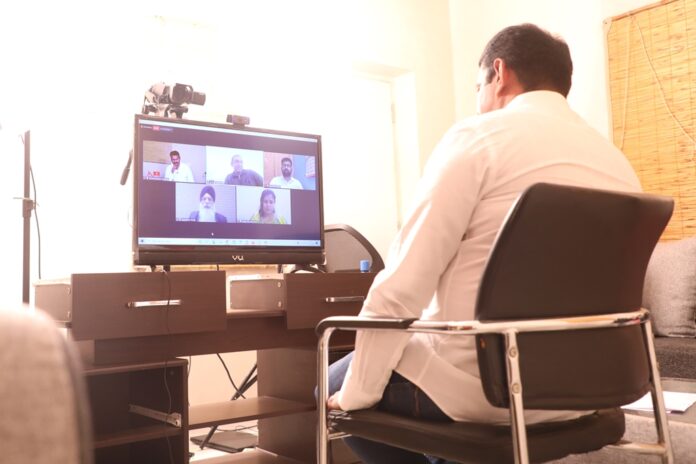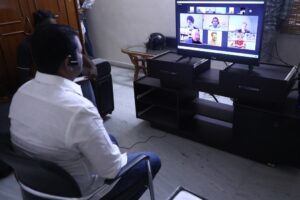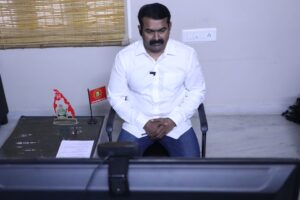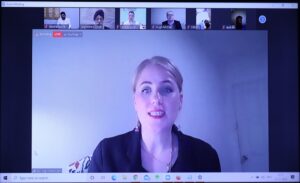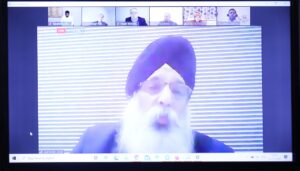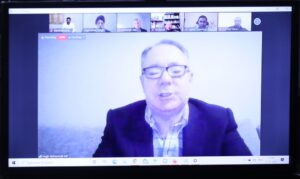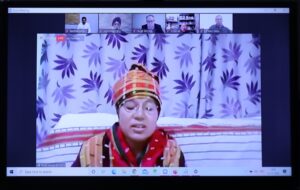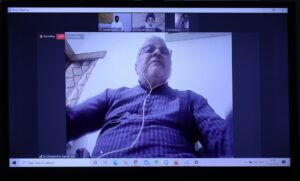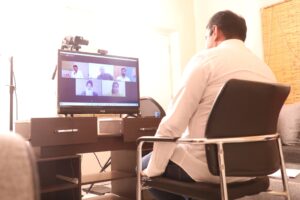ஐக்கிய நாடுகள் அவையால் அனைத்துலக மனித உரிமைகள் சட்டம் ஏற்றுக்கொள்ளப்பட்ட டிசம்பர் 10ஆம் நாள் ஒவ்வொரு ஆண்டும் உலக மனித உரிமைகள் நாளாக கடைப்பிடிக்கப்படுகிறது. ஒவ்வொரு தனி மனிதனும் தான் வாழ்வதற்கான உரிமையை பெறுவதும், சகமனிதர் வாழ்வதற்கான உரிமையை மதித்து நடப்பதுமே இந்நாளின் முக்கிய குறிக்கோளாகும்.
இந்நிலையில் மனித உரிமை நாளைக் கடைப்பிடிப்பதுடன் மட்டும் கடந்து போகாமல், உலகம் முழுவதும் நடக்கும் மனித உரிமை மீறல்கள் குறித்தும் அவற்றுக்கான தீர்வுகள் குறித்தும் தனிமனித உரிமைகளை ஆதரித்துக் குரல் கொடுக்கக்கூடிய பல்வேறு ஆளுமைகள் பங்கேற்ற இணையவழிக் கருத்தரங்கம் நாம் தமிழர் கட்சி சார்பில் 12-12-2020 அன்று மாலை 5 மணியளவில் நடைபெற்றது.
கருத்தரங்கில் கருத்துரையாற்றியவர்கள்:
- நெவெட்சோ வெணு
முன்னாள் பொதுச்செயலாளர், நாகா மக்கள் இயக்கம்.
வரலாறு மற்றும் தொல்பொருள் துறை பேராசிரியர், நாகாலாந்து பல்கலைக்கழகம். வடகிழக்கு இந்திய வரலாற்றுச் சங்க நிரந்தர உறுப்பினர் மற்றும் Forum for Naga Reconciliation (FNR) எனப்படும் நாகா நல்லிணக்க மன்ற உறுப்பினர்.
- ஆஷ்லே நியூன்ஹம்
சமூக செயற்பாட்டாளர், விக்டோரியா, ஆஸ்திரேலியா.
ஆஸ்திரேலியாவைச் சேர்ந்த உலக மனித உரிமை ஆர்வலர் மற்றும் வழக்கறிஞர். 2009ல் ஈழத்தில் நடந்த இனப்படுகொலை குறித்த தனது வலுவான கண்டனக்குரலை ஐக்கிய நாடுகள் சபையில் நாம் தமிழர் கட்சி பிரதிநிதிகளுடன் இணைந்து பதிவு செய்தவர்.
- ஹக் மெக்டர்மாட்
சட்டப்பேரவை உறுப்பினர், நியூ சவுத் வேல்ஸ், ஆஸ்திரேலியா.
Labor party – இன் சட்ட விவகார குழுத்தலைவர் மற்றும் பாராளுமன்ற குழு உறுப்பினர். தேர்தலுக்கு முன் வழக்குரைஞராகவும் முதுகலை பொருளாதார குற்றவியலின் இயக்குனராகவும் பணியாற்றியவர்
- பதல் கன்யா ஜமாத்தியா
நிறுவனர், Tripura people’s front, திரிபுரா.
திரிபுராவின் முக்கியக் கட்சியாக உருவெடுத்து வரும் Tripura people’s front கட்சியின் தலைவர். பள்ளிக்காலம் முதல் திவிப்ரசா என்றழைக்கப்படும் திரிபுரா பூர்வகுடியினரின் பாதுகாப்பிற்காக உச்சநீதிமன்றம் சென்று போராடியவர்.
- ப்ரையன் சேனவிரத்னே
ஆட்சிக்குழு உறுப்பினர், நாடுகடந்த தமிழீழ அரசு, பிரிஸ்பேன், ஆஸ்திரேலியா.
சிங்களரான திரு.ப்ரையன் வடகிழக்கில் தனித்தமிழீழ அரசாங்கம் அமைவதே அமைதிக்கு தீர்வு என்பதில் நம்பிக்கை கொண்டவர். மேலும் விடுதலை புலிகள் பயங்கரவாத குழு அல்ல என்றும் பரப்புரை செய்து வருபவர்.
- தரம்வீர் காந்தி
முன்னாள் பாராளுமன்ற உறுப்பினர்
நிறுவனர், நவான் பஞ்சாப் கட்சி – பஞ்சாப்.
பட்டியாலா தொகுதியின் முன்னாள் நாடாளுமன்ற உறுப்பினர்.
- சியோபைன் மெக்டொனா
மிட்சம் அண்ட் மாடர்னின் பாராளுமன்ற உறுப்பினர். UK
UK பாராளுமன்றத்தின் தமிழருக்கான அனைத்துக் கட்சி பாராளுமன்றக் குழுவின் உறுப்பினர் தலைவர். பிரிட்டிஷ் பாராளுமன்றத்திலும் ஐ.நா சபையிலும் சிங்கள இன பயங்கரவாதத்திற்கெதிரான கண்டனக்குரலை வலுவாக பதிவு செய்த முதல் நபர்.
- தீபக் பவார்
சமூக செயற்பாட்டாளர், இணை பேராசிரியர், மும்பை பல்கலைக்கழகம்.
குடிமை மற்றும் அரசியல் துறை இணை பேராசிரியரான இவர் ஒப்பீட்டு முன்னோக்க அடிப்படையில் மொழிக்கொள்கை ஆய்வில் ஈடுபட்டு வருவதோடு 200-க்கும் மேற்பட்ட செய்திக்கட்டுரைகள் மற்றும் 5 புத்தகங்களும் எழுதியுள்ளார்.
- திரு. உதயன் குமார் கோகோய்
பொதுச்செயலாளர், அஸ்ஸாம் ஜத்தியதபதி யுப பரிஷத், அஸ்ஸாம்.
தொழிலதிபரான இவர், அஸ்ஸாம் மற்றும் வடகிழக்கு மாநில மக்களின் உரிமை மீட்சிக்காகவும் பணியாற்றி வருகிறார்.
- திரு. கர்கா சாட்டர்ஜி
தலைவர், பங்களா போக்கோ, இணை பேராசிரியர், இந்திய புள்ளிவிவர நிறுவனம், மேற்கு வங்கம்.
ஹார்வர்ட் பல்கலைக்கழகத்தில் பயின்றவரான இவர் இந்தியாவில் உள்ள பல்வேறு மொழிகள் மற்றும் மொழிவழி தேசிய இனங்களிம் சம உரிமைக்காக போராடுபவர்.
RESOLUTIONS
federalism & secularism – challenges & solutions
Introduction
Respectfully honoring the United Nations Declaration of Human Rights adopted on 10 December 1948, the Human Rights Wing of the Naam Tamilar Katchi, observing the International Human Rights Day stands in solidarity will all oppressed individuals, societies, nationalities, regional identities and peoples across the globe. Endorsing the right to self-determination of all peoples and nationalities, the Naam Tamilar Katchi reiterates its resolve to uphold this right enabling peoples to be masters of their own destiny.
Since the last 70 years, Indian rulers from different political parties have perpetuated the imperialistic structure and governance modules handed over to them by the British imperialists. Even though India adopted a constitution which was meant to be truly federal in nature to respect the rights of nationalities and regional identities, the working of the Indian polity over the decades has been totally in breach of the principle of federalism.
The Indian state has continued with some old British times draconian laws like preventive, detention, and sedition. India has framed laws like UAPA – Unlawful Activities Prevention Act, 1967 and continues to frame new anti-people legislations to convert India into a monolithic country under the “one nation, one language, one religion and one identity” principle of the right-wing forces.
Hundreds of political prisoners – prisoners of conscience are languishing in prison on trumped-up charges. Human rights defenders are being hounded. Students, lawyers, activists and leaders are defamed, charged, arrested and thrown into far-flung prisons.
The rights of states, mostly formed on linguistic lines are being undermined by the Union changing the federal structure by interference and intervention in subjects which are state subjects and using the brute majority in parliament to pass these draconian laws.
This year’s Human Rights Day theme relates to the COVID19 pandemic and focuses on the need to build back better by ensuring that human rights are central to all recovery efforts. India, unfortunately, has failed to maintain the constitutional rights of the people despite its quasi-federal structure. State governments have not been allocated enough funds to meet the gigantic problem of health unfolding in various parts of the country due to the pandemic. Many countries, including India, in the face of the pandemic, have failed to uphold the principle of federalism whilst sharing funds for relief, health and rebuilding the economy.
International intervention and the right to self-determination have rarely been discussed areas in the Indian subcontinent, except by those whose rights have been trampled and are struggling to achieve them.
Understanding the state of Human Rights in South Asia, recognising the provisions of federalism enshrined in the Constitution of India and deeply concerned about the recent developments of violation of human rights in the region, this meeting unanimously adopts the following resolutions:
- Saluting the farmers for their unprecedented 16-day struggle, which continues to gather strength with every passing day, this assembly of speakers and experts from across the globe acknowledge the contribution of the farmers and people of Punjab in forging and living up to the true concept of federalism by standing up for the rights of the states of the Indian Union. We, unequivocally endorse all the demands of the Farmers Morcha.
- This meeting emphasizes the need for reforms and change. No law, rule, principle is definitive for all times. As we all recognise the need for a federal structure, on the World Human Rights Day, we emphasize the need to revisit the entire gamut of the Indian constitution to attune it to the human rights, civil and political, social, economic and cultural rights of the peoples and nationalities, the ever-changing legal and social framework of world society, recognising the principles of inclusiveness, coexistence and tolerance at all levels. This is the road to a peaceful South Asia and the World and we are all determined to stay committed this goal.
- This assembly affirms that the true federal structure of the Constitution of India must be maintained and wherever required improvised upon to restore, protect and preserve the legitimate rights of the people. The federal structure, as envisaged by the framers of the Constitution of India should be respected and the items in the state list should not be moved to the Concurrent List and Union list.
- Anti-People legislation like the Citizenship Amendment Act, the National Register of Citizens and the National Population Register, the New Education Policy, Environmental Impact Assessment, NEET Exams, Electricity Amendment Bill, the Farmers Produce Trade and Commerce (Promotion and Simplification) Act 2020, the Farmers (Empowerment and Protection) Agreement on Price Assurance and Agricultural Services Act 2020, the Essential Commodities (Amendment) Act 2020, the high-penalty imposing Stubble burning Ordinance – ‘Commission for Air Quality Management in National Capital Region and Adjoining Areas Ordinance 2020’, the Electricity Amendment Bill 2020, must be repealed immediately to restore the rights of farmers as well as honour the right of states to adjudicate upon this.
- The already inefficient and insufficient health system of the states in India is under strain. So, not only speaking generally but even with reference to health, there is a dire need to implement the provisions of federalism. The rights of the states to an equal share of funds to meet the COVID19 pandemic and its fallout on health and economy must be respected. We urge the Indian government not to dilute federalism and restore the rights of states to protect the right to health of all states.
- In a classic case of a State governor not honouring the judgement of the Supreme Court of India, the resolution of a State Assembly, the Tamil Nadu governor has stalled the release of 7 prisoners in the Rajiv Gandhi case, who have completed their jail terms. We seek their immediate and unconditional release.
- Likewise, we seek the immediate and unconditional release of lawyers, student activists and others detained during the anti-CAA protests as well as those authors, pastors, human rights defenders and activists who have been detained in the Bhima Koregaon cases.
- We condemn the measured silence of the Indian Union government on Mob Lynching of beef eaters and the ban on cow slaughter. The Right to Food of people of different ethnic and cultural backgrounds must be recognized and respected.
- In recent years there has been an unprecedented growth of atrocities on Dalits, Adivasis and minorities. The union government should intervene immediately and protect the interests of these groups instead of being mute spectators and tacitly supporting the right-wing perpetrators of the attacks with the full connivance of the police and administrative machinery.
- This forum strongly condemns the violation of the Instrument of the accession of Tripura and Nagaland and demands that the government prevent the ongoing colonisation of that region. The right to rule Tripura land must be given back to Twiprasa (indigenous peoples of the region) and Nagaland to the Nagas. We must always preserve the land to protect the rights of indigenous people in all policies, strategies and interventions.
- This forum strongly condemns the violation of the merger agreement of Assam to the Indian Union. Right to self-determination of Assam people and right of autonomy must be respected to protect their cultural and economic rights.
- This forum recognizes the genocide of Tamils in Sri Lanka. We demand an impartial International Independent investigation into the acts of Genocide by the Sri Lankan armed forces and the politicians responsible for it. The structural genocide of Tamils must be stopped immediately. The North and the East of Sri Lanka must be demilitarized and the land grabbed from the Tamils restored to the rightful owners without delay. The Buddhisisation and Sinhalisation along with Sinhala Colonisation and population transfer of Sinhalese into Tamil areas must be stopped immediately.
- While we unequivocally endorse the Right to Self-determination of Eelam Tamils, we demand that India recognize and take up the issue of the Right to Self Determination of the Tamils with the United Nations.

